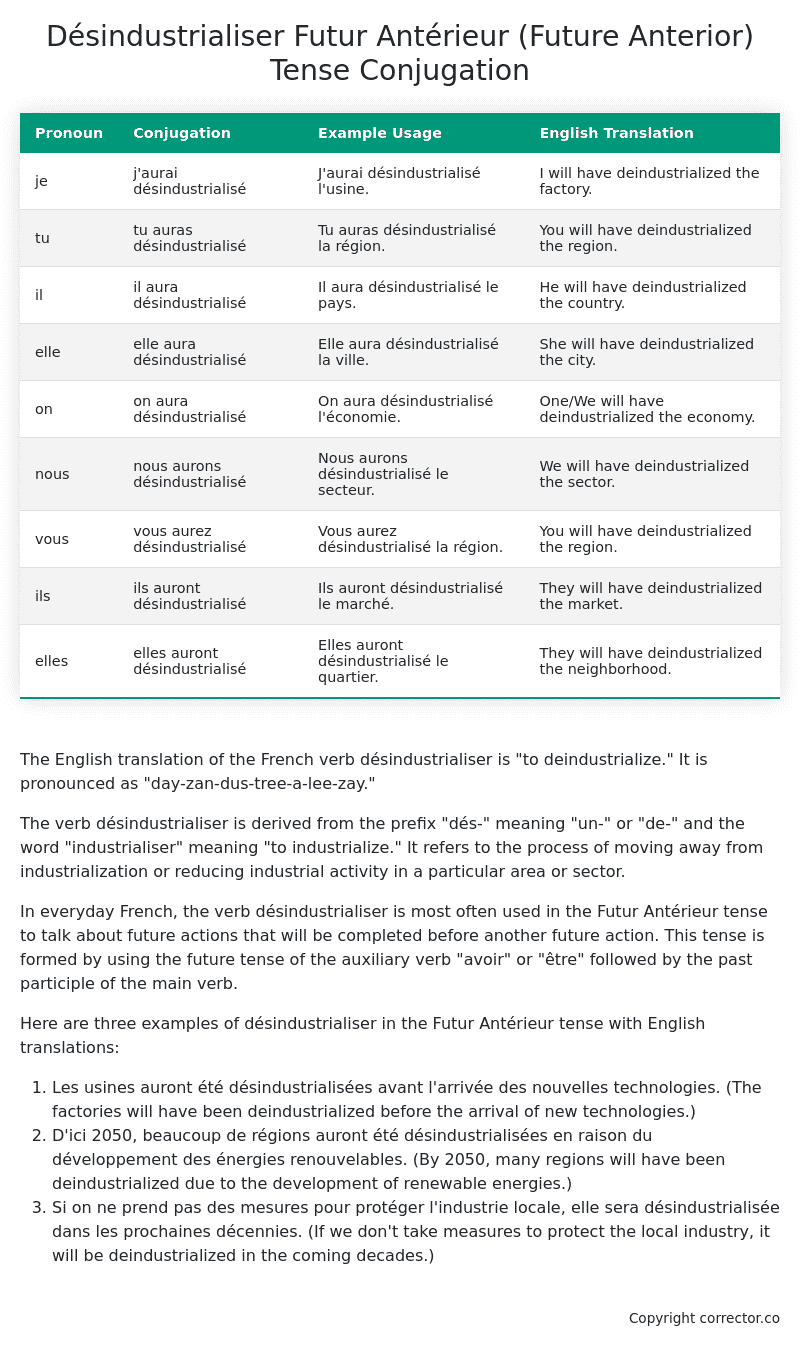Futur Antérieur (Future Anterior) Tense Conjugation of the French Verb désindustrialiser
Introduction to the verb désindustrialiser
The English translation of the French verb désindustrialiser is “to deindustrialize.” It is pronounced as “day-zan-dus-tree-a-lee-zay.”
The verb désindustrialiser is derived from the prefix “dés-” meaning “un-” or “de-” and the word “industrialiser” meaning “to industrialize.” It refers to the process of moving away from industrialization or reducing industrial activity in a particular area or sector.
In everyday French, the verb désindustrialiser is most often used in the Futur Antérieur tense to talk about future actions that will be completed before another future action. This tense is formed by using the future tense of the auxiliary verb “avoir” or “être” followed by the past participle of the main verb.
Here are three examples of désindustrialiser in the Futur Antérieur tense with English translations:
- Les usines auront été désindustrialisées avant l’arrivée des nouvelles technologies. (The factories will have been deindustrialized before the arrival of new technologies.)
- D’ici 2050, beaucoup de régions auront été désindustrialisées en raison du développement des énergies renouvelables. (By 2050, many regions will have been deindustrialized due to the development of renewable energies.)
- Si on ne prend pas des mesures pour protéger l’industrie locale, elle sera désindustrialisée dans les prochaines décennies. (If we don’t take measures to protect the local industry, it will be deindustrialized in the coming decades.)
Table of the Futur Antérieur (Future Anterior) Tense Conjugation of désindustrialiser
| Pronoun | Conjugation | Example Usage | English Translation |
|---|---|---|---|
| je | j’aurai désindustrialisé | J’aurai désindustrialisé l’usine. | I will have deindustrialized the factory. |
| tu | tu auras désindustrialisé | Tu auras désindustrialisé la région. | You will have deindustrialized the region. |
| il | il aura désindustrialisé | Il aura désindustrialisé le pays. | He will have deindustrialized the country. |
| elle | elle aura désindustrialisé | Elle aura désindustrialisé la ville. | She will have deindustrialized the city. |
| on | on aura désindustrialisé | On aura désindustrialisé l’économie. | One/We will have deindustrialized the economy. |
| nous | nous aurons désindustrialisé | Nous aurons désindustrialisé le secteur. | We will have deindustrialized the sector. |
| vous | vous aurez désindustrialisé | Vous aurez désindustrialisé la région. | You will have deindustrialized the region. |
| ils | ils auront désindustrialisé | Ils auront désindustrialisé le marché. | They will have deindustrialized the market. |
| elles | elles auront désindustrialisé | Elles auront désindustrialisé le quartier. | They will have deindustrialized the neighborhood. |
Other Conjugations for Désindustrialiser.
Le Present (Present Tense) Conjugation of the French Verb désindustrialiser
Imparfait (Imperfect) Tense Conjugation of the French Verb désindustrialiser
Passé Simple (Simple Past) Tense Conjugation of the French Verb désindustrialiser
Passé Composé (Present Perfect) Tense Conjugation of the French Verb désindustrialiser
Futur Simple (Simple Future) Tense Conjugation of the French Verb désindustrialiser
Futur Proche (Near Future) Tense Conjugation of the French Verb désindustrialiser
Plus-que-parfait (Pluperfect) Tense Conjugation of the French Verb désindustrialiser
Passé Antérieur (Past Anterior) Tense Conjugation of the French Verb désindustrialiser
Futur Antérieur (Future Anterior) Tense Conjugation of the French Verb désindustrialiser (this article)
Subjonctif Présent (Subjunctive Present) Tense Conjugation of the French Verb désindustrialiser
Subjonctif Passé (Subjunctive Past) Tense Conjugation of the French Verb désindustrialiser
Subjonctif Imparfait (Subjunctive Imperfect) Tense Conjugation of the French Verb désindustrialiser
Conditionnel Présent (Conditional Present) Tense Conjugation of the French Verb désindustrialiser
Conditionnel Passé (Conditional Past) Tense Conjugation of the French Verb désindustrialiser
L’impératif Présent (Imperative Present) Tense Conjugation of the French Verb désindustrialiser
L’infinitif Présent (Infinitive Present) Tense Conjugation of the French Verb désindustrialiser
Struggling with French verbs or the language in general? Why not use our free French Grammar Checker – no registration required!
Get a FREE Download Study Sheet of this Conjugation 🔥
Simply right click the image below, click “save image” and get your free reference for the désindustrialiser Futur Antérieur tense conjugation!

Désindustrialiser – About the French Futur Antérieur (Future Anterior) Tense
Construction
Common Everyday Usage Patterns
Interactions with Other Tenses
For example
Summary
I hope you enjoyed this article on the verb désindustrialiser. Still in a learning mood? Check out another TOTALLY random French verb conjugation!


